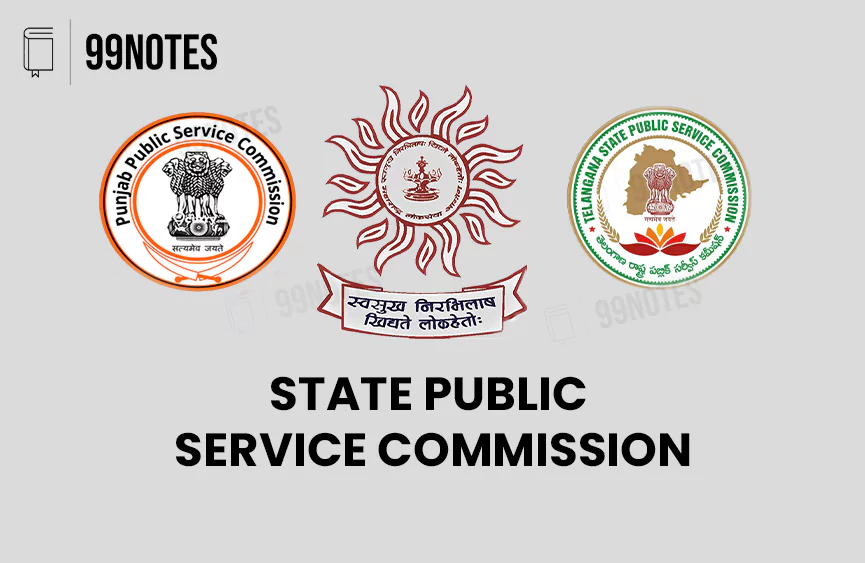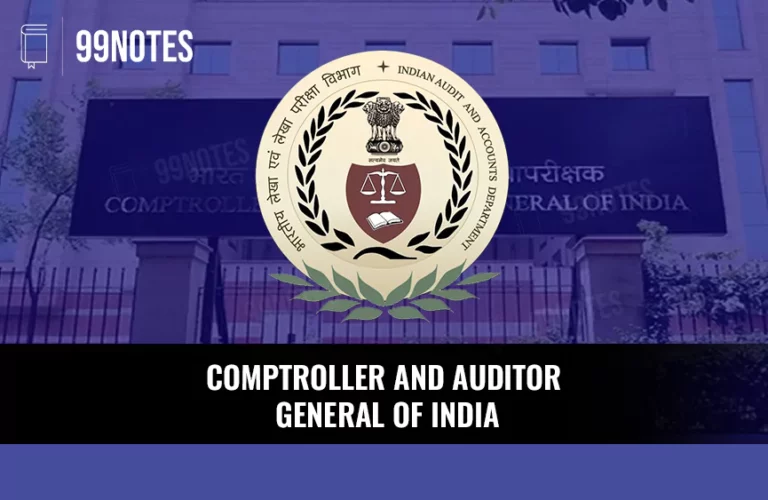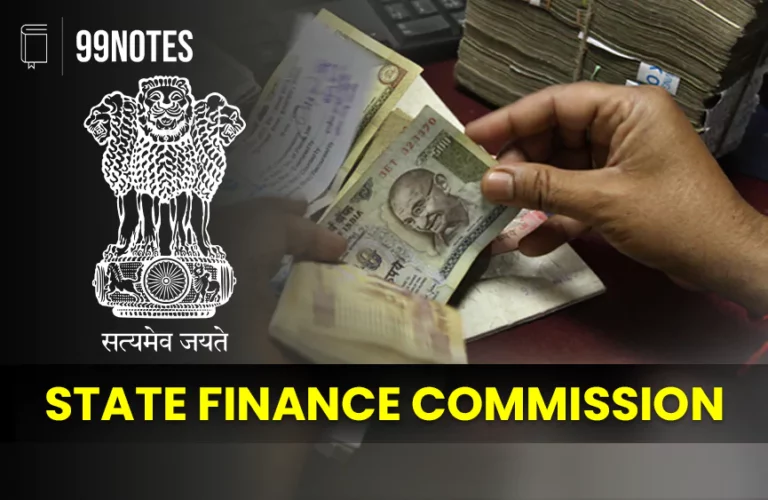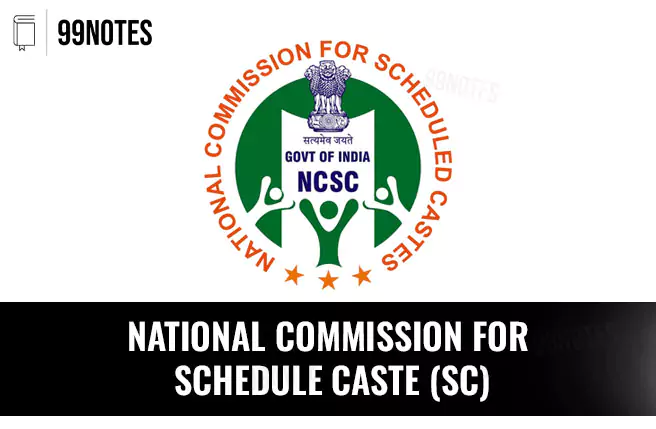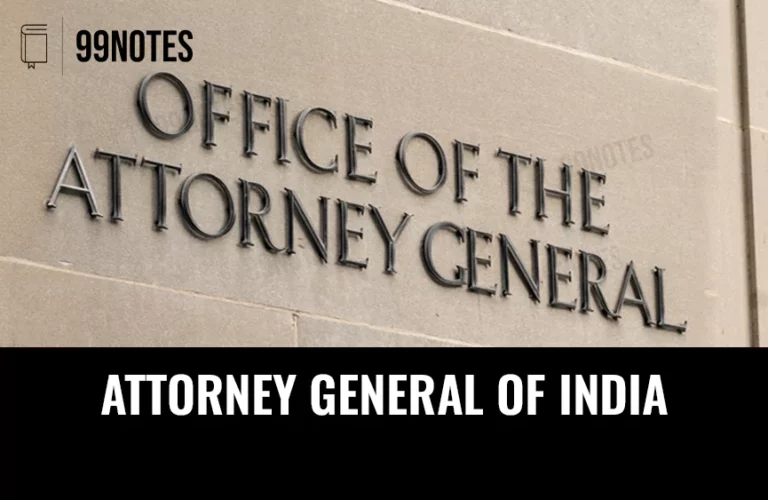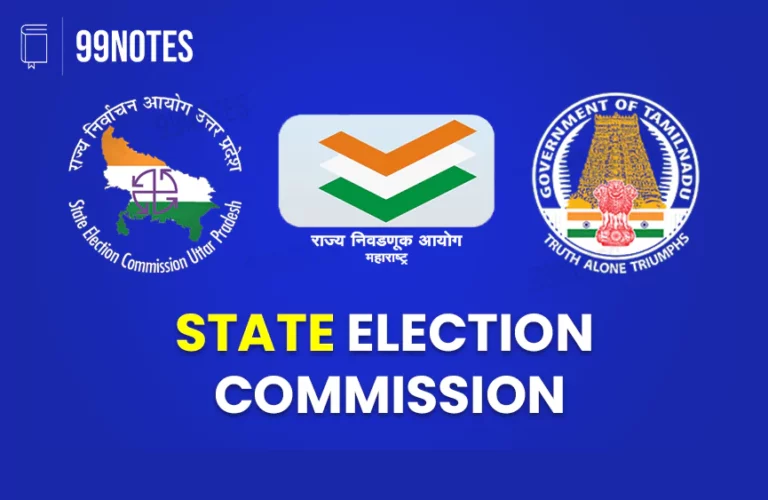State Public Service Commission (State PCS) UPSC Notes
State Public Service Commission
Civil servants play an important role in the administration and governance of the country. They assist political executives in various day-to-day activities and policy-making processes. It is imperative that the recruiting process for civil servants into government service must be effective, impartial and merit-based.
Constitutional provisions:
- The task of selecting the right individual to be recruited for the highest service in the country is vested in the State Public Service Commission (SPSC) and the Union Public Service Commission (UPSC).
- They are independent constitutional bodies formed under Article 315 for recruiting civil servants. Articles 315 to 323 in Part XIV of the Constitution describe the composition, appointment and removal of members and various aspects related to independence, powers and functions of the SPSC.
- The Constitutional status of the Commission is crucial as it can function without being influenced by political or other extraneous consideration Therefore, it safeguards against any potential interference with the authority and independence of the Commission, either by the legislature or the executive.
Composition, Appointment and Tenure of State PCS
The constitution states that the chairman and ‘other’ members of the State Public Service Commissions are to be appointed by the State Governors. The total strength of the Commission is not specified in the Constitution, but it has been left to the discretion of the Governor.
- Qualification: No specific qualification is prescribed for the members of the Commission. However, the Constitution under Article 316 states that one-half of the members of the Commission should be such persons who have held office for at least ten years either under the Government of a state or the Government of India. (i.e. half of State PSC members are ex-civil servants)
- Appointment as acting chairman: The Constitution allows the Governor to appoint one of the members of SPSC as an acting chairman if:
-
- The office of Chairman falls vacant, or
- The Chairman is not able to perform his functions due to absence or any other reason.
The acting Chairman remains in office until the Chairman resumes his duties or any other person is appointed as Chairman.
Conditions of Service:
- Conditions of Service: The condition of service of the Chairman and other members of the Commission is determined by the Governor.
- Tenure: The Chairman and Commission members hold office for six years or until they turn 62, whichever is earlier (the age limit is 65 years in the case of UPSC). However, they can renounce their offices by addressing their resignation to the Governor.
- Removal: Only the President can remove the Chairman and members of SPSC before the expiry of their term in the manner as provided in the Constitution.
Removal and Suspension of members of State Public Service Commission
The Chairman or any other member of State Public Service commission can be removed from office by the President under the following circumstances:
- If he is adjudged insolvent (bankrupt);
- If, during his term of office, he engages in any paid employment outside the duties of his office or
- If, in the opinion of the President, he is unfit to continue in office by reason of infirmity of mind or body.
Additionally, the Chairman or any other member of UPSC can be removed by the President for misbehaviour. The Constitution states that the Chairman or any member of UPSC is deemed to be guilty of misbehaviour if he:
- Is interested in or connected with any contract or agreement made by the Government of India or the State Government or
- Engages in any way in the profit of such contract or agreement or any benefit arising from it otherwise than as a member and in common with other members of an incorporated company.
The Governor may also suspend the Chairman or a member of the UPSC pending an enquiry by the Supreme Court.
Ensuring Independence
The Constitution incorporates the following safeguards to ensure the independent and impartial functioning of the SPSC:
- Security of tenure: The Chairman or a member of the SPSC can be removed from office by the President only on the grounds mentioned in the Constitution (grounds stated above).
- Conditions of Service – The conditions of service of the Chairman or a member are determined by the Governor, but they cannot be varied to their disadvantage after appointment.
- Expenditure not subject to vote of State Legislature: The entire expenses, including the salaries, pensions and allowances of the Commission’s Chairman and members, are charged on the Consolidated Fund of State, which is not subject to vote of State Legislature.
- Chairman and members ineligible for reappointment: The Chairman and members of SPSC, on the expiration of their term of office, are not eligible for reappointment to that office (Article 316). Therefore, they are ineligible for a second-term appointment.
- Appointment of Chairman only for certain posts: The Chairman of SPSC, on ceasing to hold office, is not qualified for any other employment in the Government of India or a state except as a member or Chairman of UPSC or as the Chairman of any other SPSC (Article 319).
- Appointment of members only for certain posts: A member of SPSC (on ceasing to hold office) is qualified for appointment only as the Chairman or member of UPSC or as the Chairman of that State Public Service Commission (SPSC) or any other SPSC, but not for any other employment in the Government of India or a state (Article 319).
The purpose of the above provisions, as mentioned in points number 4, 5, and 6, is to insulate the Commission and its members from any possibility of being influenced either by a lure of office or by a threat of insecurity or any other reason.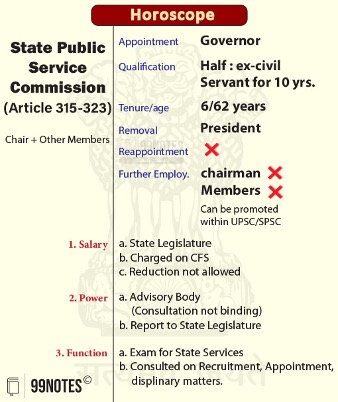
Functions of State PCS
As a recruiting agency, SPSC has functions similar to that of the UPSC. These functions can be classified into three categories:
1. Executive Functions:
- It conducts examinations for appointments to various state services. It also conducts many written examinations for different posts apart from holding interviews to select candidates for specialised and other categories of positions.
- Presentation of Report:
- It is the Commission’s responsibility to present an annual report on the work done by the Commission to the Governor.
- This Report, along with the memorandum describing the action taken by the Government on the recommendations, is placed before the State Legislature.
- Therefore, the Government is responsible for explaining the reasons in case the recommendations of the Commission are not accepted.
- Conferment of Additional Functions:
- As per Article 321 of the Constitution, the State Legislature can confer additional functions on SPSC pertaining to the State Civil Service or the services of a local authority or other corporate bodies. Therefore, the jurisdiction of SPSC can be extended by an Act of State Legislature.
2. Consultation Functions:
The Constitution states that the Government should consult the Commission on the following matters:
- All disciplinary actions affecting a government employee, like withholding of increments or promotion, censure, reduction to a lower grade, removal or dismissal from service, compulsory retirement,
- Claims for reimbursement of costs incurred by an employee in legal proceedings instituted against him for the acts done in the execution of his duty.
- Claims for the award of pension in connection with injuries sustained by an employee while serving under the Government.
- Any other matter concerning personnel management.
The Supreme Court has held that if the Government shows irregularity or fails to consult SPSC in the matters (discussed above), the aggrieved public servant has no remedy in court.
Thus, the above provision is directory and not mandatory in nature. The court also ruled that a selection for a post by the SPSC does not confer any right upon the candidate. But the Government is expected to act fairly and without arbitrariness or mala fide.
| Apart from consulting the state High Court, the Governor also consults SPSC while framing rules for appointment to judicial service in the state (except for the post of district judges) |
3. Advisory Functions:
SPSC advises the Government in matters relating to:
- Methods of recruitment to civil services
- The principles to be followed while making appointments, promotion and transfer from one service to another and appointments by transfer or deputation
- Advise the state government on a matter referred by the Governor.
Limitation of the Advisory function of UPSC
- It is to be noted that the SPSC’s jurisdiction is purely advisory. According to Article 320 (3), the Commission must advise the Government on all matters concerning methods of recruitment, promotions and transfers from post.
- Government is under no obligation to accept the advice the Commission provides. Thus, it is an advisory nature.
However, constitutional restraint is imposed on the non-acceptance of the Commission’s advice under Article 323. If the advice of the Commission is not accepted, the Government is required under Article 323 to place before the Parliament a memorandum explaining the reasons for such non-acceptance.
- While dealing with the Commission’s advice, the power of the Ministry or Department has been deliberately restricted, so the advice cannot be rejected unless it has the approval of the Appointments Committee of the Cabinet.
- No administrative department can act against the advice of the Commission unless it has the concurrence of the Committee.
Limitations of the Functioning of State PCS
The following matters are placed outside the functional jurisdiction of the SPSC:
- Making reservations in appointments or posts for any backward class of citizens.
- Considering the claims of scheduled castes and scheduled tribes for making appointments to services and posts.
Governor’s power for exclusion:
Further, the Governor has the power to exclude posts, services and matters from the scope of the SPSC.
- The Constitution states that with respect to state services and posts, the Governor may make regulations specifying the matters that shall not be necessary for SPSC to be consulted.
- However, all such regulations shall be laid before each House of State Legislature for at least 14 days. The State Legislature is powered to amend or repeal them.
State Vigilance Commission’s impact on SPSC’s role |
| ● The role of SPSC in disciplinary matters was affected after the emergence of the State Vigilance Commission (SVC) in 1964.
● While taking disciplinary action against a civil servant, both are consulted by the Government. However, the problem arises when conflicting advice is tendered. ● The SPSC has an edge over the SVC as it has been an independent constitutional body. |
Difference between UPSC and SPSC
<trstyle=”background-color: #fff2cc”>Annual Report is submitted toPresidentGovernor
| Union Public Service Commission | State Public Service Commission | |
| Qualification | No specific qualification is prescribed
One-half of the members of the Commission should be such persons who have held office for at least ten years either under Govt of a state or Govt of India (Article 316) |
No specific qualification is prescribed
One-half of the members of the Commission should be such persons who have held office for at least ten years either under Govt of a state or Govt of India (Article 316) |
| Appointment | President | Governor |
| Term | 6 years or until they turn 65, whichever is earlier | 6 years or until they turn 62, whichever is earlier |
| Composition | The strength of the Commission is not specified in the Constitution
Left to the discretion of the President: Chairman + 10 members currently. |
The strength of the Commission is not specified in the Constitution
Left to the discretion of the Governor |
| Resign to | President | Governor |
| The Chairman and members are removed by | President | President |
| Conditions for Removal | Adjudged insolvent (bankrupt);
Engages in any paid employment outside the duties of office or Unfit to continue in office by reason of infirmity of mind or body (in the opinion of the President) Removal for misbehaviour after enquiry by the Supreme Court |
Adjudged insolvent (bankrupt);
Engages in any paid employment outside the duties of office or Unfit to continue in office by reason of infirmity of mind or body (in the opinion of the President) Removal for misbehaviour after enquiry by the Supreme Court |
| Reappointment to that office
(Article 316) |
Chairman and members are not eligible for reappointment to that office. | Chairman and members are not eligible for reappointment to that office. |
| Government Appointment after retirement form the commission
(Article 319) |
Chairman: ineligible for any government post.
Member: qualified for appointment only as the Chairman of UPSC or a State Public Service Commission but not for any other position in the Government of India or a state. |
Chairman – not qualified for any other employment in the Government of India or a state except as a member or Chairman of UPSC or as the Chairman of any other SPSC.
Member: qualified for appointment only as the Chairman/member of UPSC or Chairman of any State Public Service Commission (SPSC), but no other govt. employment. |
Challenges for the SPSC
- Corruption in the recruitment process has been a serious issue that impacts the confidence of people in the sanctity of a constitutional body to recruit the best candidates based on merit. For example, a section officer in the ‘highly confidential section’ of Uttarakhand Public Service Commission was arrested for allegedly selling the question paper.
- Political interference that suits the political self-interest rather than the merit-based system.
- Delay in completion of selection processes: Due to corruption and leakage of question papers, the examination process is often halted or cancelled, causing inconvenience to serious candidates and consequently lowering their morale.
Suggestions for efficient functioning of SPSC
- Transparency and accountability within SPSC should be increased to reduce the scope of corruption inside the Commission.
- SPSC should conduct regular examinations and promptly declare the result within the standard time.
- There should be no political or governmental interference in the recruitment process. Government intervention, if any, should be made in the public interest.
- SPSC can adopt UPSC’s best practices to enhance confidence.
Joint Public Service Commission
According to the Constitution, a Joint State Public Service Commission (JSPSC) can be established for two or more states. UPSC and SPSC are established directly by the Constitution under Article 315, while for JSPSC Constitution only declares the method for its creation. It was for the first time under the Government of India Act of 1935 that advocated for creating a Joint Public Service Commission for two or more provinces along with the Federal Public Service Commission and Provincial Public Service Commission.
Establishment of JSPSC –
- It can be created by a Parliament act at the request of the concerned state legislatures.
- Therefore, it is a statutory body, unlike UPSC and SPSC, which are constitutional bodies.
- For example, after the separation of Haryana from Punjab, the two states chose to have a JSPSC for a short time period in 1966.
Appointment and condition of service of JSPSC members
- Appointment – The President appoints the Chairman and members of a JSPSC.
- Tenure – They hold office for a term of six years or until the age of 62 years, whichever comes first.
- Removal – The President has the authority to suspend or remove They can also submit their resignation letters to the President and resign from their offices.
- Conditions of Service – The President determines the number of JSPSC members and their service conditions.
- Annual Performance Report – JSPSC presents this Report to each of the concerned state governors, which is, in turn, placed before the respective state legislature.
| It is pertinent to note that if a state is not comfortable with creating SPSC or JSPSC due to some circumstances, then the state governor of the concerned state can request UPSC to serve the needs of the state with the prior approval of the President. |
Conclusion: Civil servants have made monumental contributions to India’s growth story. The Public Service Commission’s provide a fundamental framework for recruiting civil servants upholding the meritocracy in Indian government services. The unwavering commitment showcased by UPSC and various SPSCs to provide an efficient, impartial and equitable recruitment process has increased public confidence and provided equal opportunities to all sections of society to become part of the prestigious services.

